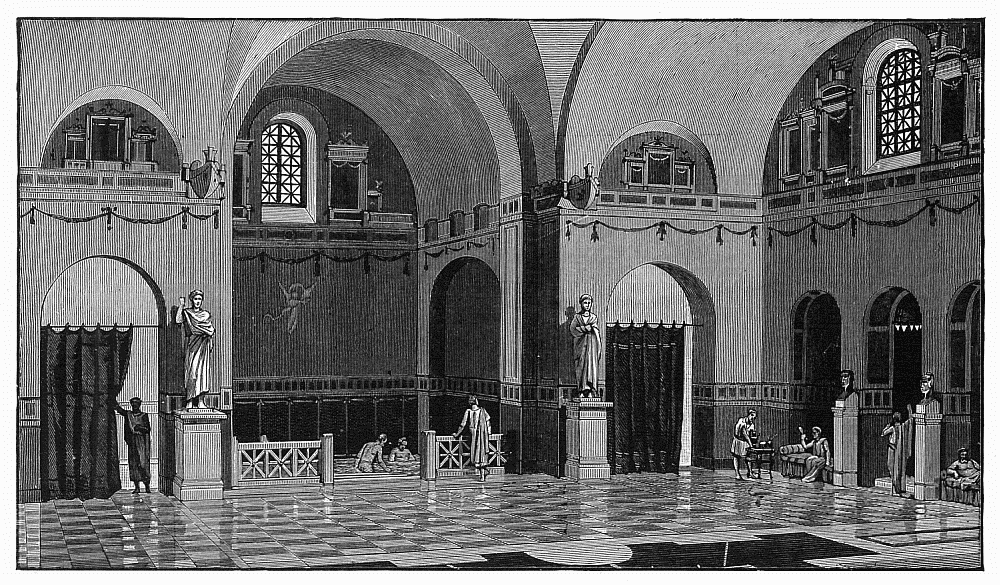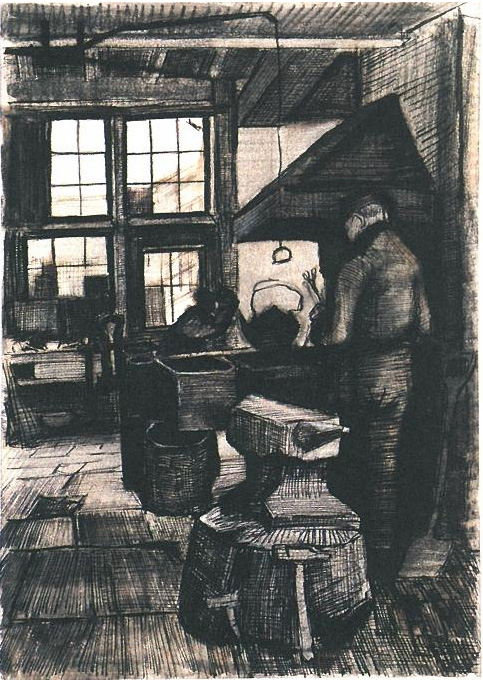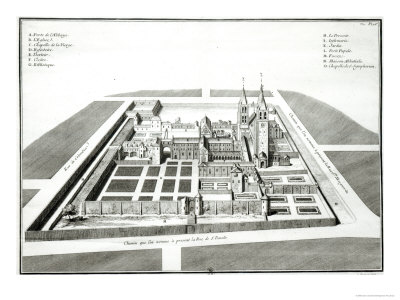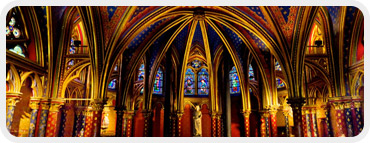Are you an old building in Paris? Are you hoping not to be
torn down at some point in history? Here are a few simple tips for your
survival.
1. Get to know
Baron Haussmann. He makes all of the decisions on what stays and what
goes. (Or you can try to get to know Napoleon, he seems to wield a bit of
power, but I do think that'd prove a little harder.)
 |
| Baron Haussmann |
2. Longevity. If you are already in existence
and have already been in Paris for a few centuries, your chances of survival
have improved.
2.a. Be useful, too. The
French are suckers for tradition. They go to same boulangerie and shop at
the same street markets for generations. If you're a building near a
useful food market, or an important thoroughfare, or garden, you're more likely
to survive. Beware, however, some locations are better than others.
Haussmann may keep the street market, but level the buildings around it!
3. Be well built. We
can't have you falling apart, or else they'll elect to tear you down. To
ensure this, your best options are:
 |
| A Roman: Augustus |
3.1.a. Stone. Be built of stone.
3.1.b. Be an important building from the get-go. Nearly any builder will build you well if you are an important.
3.1.c. Hire the Romans. No, seriously, they built everything to stay. Remember the Colloseum?
3.1.d. Medieval peasants. They are a good bet for being well-built, but only if you are a religious building.
3.1.e. Royalty. You'll be given lots of TCL, money will be poured into you like you wouldn't believe, and they'll build your walls thick and strong to keep the peasants out. Win-win.
3.2. Be built on roman foundations. If you can’t be built by the romans, be built on roman foundations. They're hard to tear down, so they and anything built on top of them usually get to stay. Take ancient roman roads, or the roman baths on St. Michel where Cluny Abbey was built as evidence.
 |
| Drawing; Inside of Roman Baths on Boulevard St. Michel |
4. Location.
The middle of Paris is a good place to be, since it is the oldest part of
Paris and implies you are important and/or valued. However, if you happen to be a lesser-known
or less-important building, try to be situated on the corner of a major
Boulevard. This will not help if you are
a blacksmith shop, because they go out of fashion around the 19th
century. But if you are a café, or
boutique, you’re chances of survival improve slightly. This may mean you start off as a blacksmith
shop and must be converted to a café.
Ensure your proprietor is a smart one and makes good decisions.
 |
| Van Gogh: Blacksmith Shop |
5. Space. Hopefully you
started on several acres of land. Take an abbey, or a monastery, for
example. This usually ensures that part of you will survive the ages.
No promises though, pesky things like Revolutions may destroy you if you
are a religious building and execute all those residing within your walls.
Tread carefully.
 |
| Abbey at St.-Germain-des-Prés Only the small church in the corner survives today. |
 |
| Tour Eiffel |
6.1. Become a
national symbol. Take the Tour Eiffel. Hated by Parisians when
it was initially built, this gloriously tall edifice is now a national symbol
which Hollywood films like to destroy for the pure sake of how distraught it
makes its audience. Suggestion for becoming a national symbol: find
a literary patron (see 6.2.).
 |
| Notre-Dame |
6.2. Find a literary patron. Notre-Dame was quite accomplished on this front. Having survived the French Revolution, and though it was falling to ruin, it still stood! Until it was threatened with being torn down in which it found patron Victor Hugo who not only saved it from being torn down, but saved it from ruin and has made it quite possibly the most famous religious building in all of France. (Literary patrons are also known to have kept a good number of cafés from financial ruin. Though poor, literary patrons sometimes publish, and if news of where they ate and worked gets out, you are sure to have tourists pay for your upkeep.)
 |
| Popular Parisian Café; Favorite of Ernest Hemingway. The inside was used for Midnight in Paris |
7.Grandeur. Grandeur is important. Very
important, and the grander you are, the more likely it is you will be
considered of some value later on and not be torn down.
7.1.a. Religious: Stain glass windows. They
are most certainly a point in your favor.
7.1.b. Religious: A
royal chapel. If royalty built you or sponsored you, chances are you
more likely to stick around because its more likely you will be built quite
grand indeed. Since royalty no longer exists, I suggest you find a patron
willing to time travel and marry into the royal family. Do tell him/her
to be careful, however, French royalty has the tendency to start massacres,
incite rebellion, be assassinated, or even executed! Your patrons
assassination or execution may be a point in your favor under certain
circumstances, but also may ensure you are never built!
7.2. Palaces. While
chances are the royalty you are meant to house and their children will not live
to see your completion as a royal palace--or, if they do, that you will be
seized from them during some peasant uprising--grand palaces will usually be
considered too useful to destroy. While you may have to endure a few hard
years of being a grimy and hopeless jail cell, eventually you will probably be
converted into a Senat building, or some other Government House. You will
be well looked after for years to come.
 |
| Palais du Luxembourg |
7.3. Gardens/Public Squares.
The usefulness of gardens to the French cannot be overestimated.
Therefore if you adjoin a garden they can make public later on in
history, the chances of your surviving as a tidbit of history and being
converted into a Museum or the like are good. You may have to endure endless
years of tourists, but rest-assured this is better than not enduring at
all. Likewise, public squares that can serve a multitude of uses, particularly if they have a fountain, gives you major 'keeping' value.
 |
| St.-Sulpice. One of my favorite buildings in Paris. I have seen its square used for wedding pictures, soccer games, lunch picnics, and sunbathing. |
8. History.
History is important, and chances are that if you are of historical
significance, you will be recorded in the annals of history at least, and kept
around at best.
8.1.a. Religious:
Martyrs. Try to have a beloved Saint die or be executed on your site
(St. Denis is a good bet). Massacres or blood-baths of some other kind
are also promising.
 |
| St. Denis is in the center. Beheaded by the Romans. |
8.1.b. Religious: Patrons.
Significant religious patrons are not sure-fire, but they are helpful. Though hatred of religious symbols may come about
in some later century, there is still some sentimental value left for some
saints, like St. Genevieve.
 |
| l'Eglise Sainte-Etienne-du-Mont is dedicated to St.-Genivieve |
8.1.c. Religious:
Reliquaries. Difficult to prove as legitimate reliquaries, like the pinky finger
of St. Genevieve, or a piece of a cross from martyred saints, or the crown of
thorns from Christ’s crucifixion, they do award you a few points in importance
(see 3.b.).
8.2. Gruesome. Endure
a few years of gruesome history and you are more likely to be kept around as an
important reminder of what no one wants to happen again. Suggestions:
become a jail for a revolution; be the assassination site of a king or
important individual, be near an execution site. (Note: Becoming a jail or near an execution site is not the same as being a jail or execution site. See "Other Useful Tips".)
 |
| The Conciergerie, once a Royal Palace, was used as a prison. |
 |
| 51, rue Montmorency Home of Nicolas Flamel |
8.3.b. Mundane: Markets. Strictly speaking, if you are a market, you
are not a building and therefore have no right to be reading this exclusive
guide for buildings. However, if you
came here by accident: You have some chance of surviving as the mundane if you
are a market. (See 2. and 2.a.) Take the
flower market on the quai, or Les Halles Market—oh, wait, that was obliterated
in 1971 after centuries of use by Parisians. Nevermind. (See “Do’s and Don’ts: For Parisian Markets”)
8.4. Royal.
Yes, royal history seems to prevail. While no one can tell if it is
the grandeur, the longevity or the history that plays the biggest part, there's
no harm in stacking up your chips. Be grand. Be old. Be
significant. Have something important happen on the Courtyard or on the steps
or inside the rooms, and you're good to stay.
9. Have entertainment value. If you happen to get the worst lot: you’re built out of wood, by peasants or entertainers, you never had royalty live within your walls, you never had someone die on your steps, or assassinated in your courtyard, and you don’t have a literary patron, then you must must must have entertainment value. This is how many of the buildings of Montmartre have survived its long history of poor artists and foreign immigrants. Perhaps this comes down to location. If you are going to be built by, inhabited by, and frequented by the poor, have entertainment value, and your chances to endure live on.
 |
| History of Paris Museum - Hotel Carnavalet |
9. Have entertainment value. If you happen to get the worst lot: you’re built out of wood, by peasants or entertainers, you never had royalty live within your walls, you never had someone die on your steps, or assassinated in your courtyard, and you don’t have a literary patron, then you must must must have entertainment value. This is how many of the buildings of Montmartre have survived its long history of poor artists and foreign immigrants. Perhaps this comes down to location. If you are going to be built by, inhabited by, and frequented by the poor, have entertainment value, and your chances to endure live on.
 |
| Moulin Rouge |
10. Be beautiful. It's Paris. If you're not beautiful, if you don't shine, or light up, or if you're not detailed and intricate, if you're not visually appealing or interesting, then you won't survive.
Other Useful Tips.
- Don't end up like the Bastille. If you must be a government building, don't be built
as a jail. If you must be a public space, don't be an execution site.
These areas are often torn down or re-named.
- Don’t be a market. They’re great. They’re pretty. They’re fun.
But inevitably someone will decide all that open space should be used
for something else and a building will be born.
If you’re a building, you’re not open space. You’re a building. Win for you.
- Don’t be built during the 1960s in the outer arrondissements.
People are just beginning to discover how ugly these buildings are. (See: Be
well built. 3.) Also read: Ugly Paris
In short: Be an extraordinarily beautiful building, built by royalty primarily out of stone and stained-glass windows. Be religious enough to have a Saint martyred on your steps or house a reliquary, but not TOO religious to be torn down during the Revolution. Be in the center of the city. Stay away from markets and the Bastille. Have a courtyard. Be connected with a gruesome part of history, but don't be the gruesome part of history.
Good luck surviving; we'll check up with you in a couple hundred years.
--
In short: Be an extraordinarily beautiful building, built by royalty primarily out of stone and stained-glass windows. Be religious enough to have a Saint martyred on your steps or house a reliquary, but not TOO religious to be torn down during the Revolution. Be in the center of the city. Stay away from markets and the Bastille. Have a courtyard. Be connected with a gruesome part of history, but don't be the gruesome part of history.
Who are you?
 |
| Sainte-Chapelle |
Good luck surviving; we'll check up with you in a couple hundred years.




That was fun! Have you seen all/most of these places already? Keep 'em coming!
ReplyDeleteYes, I have seen all of the places I blogged about above. This one took a couple of hours to write, so I'll probably give myself a breather.
Delete